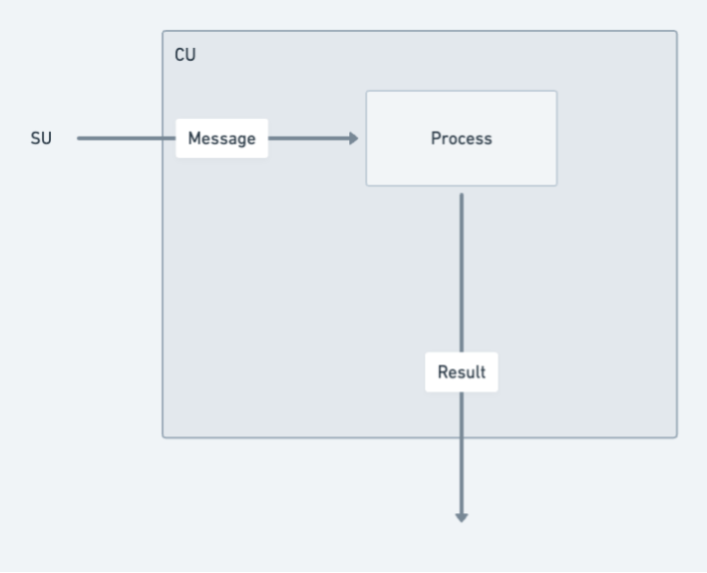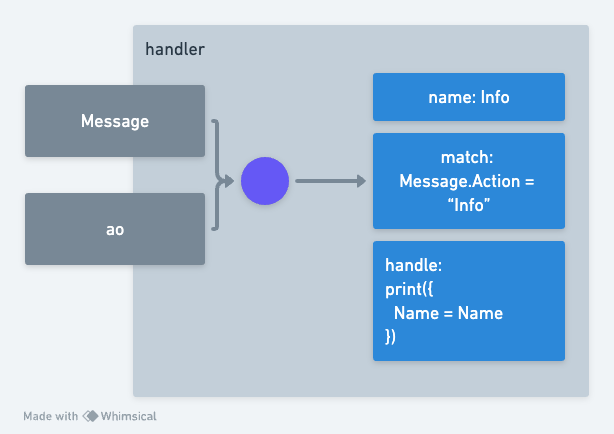Processes
Processes possess the capability to engage in communication via message passing, both receiving and dispatching messages within the network. Additionally, they hold the potential to instantiate further processes, enhancing the network's computational fabric. This dynamic method of data dissemination and interaction within the network is referred to as a 'holographic state,' underpinning the shared and persistent state of the network.

When building a Process with aos you have the ability to add handlers, these handlers can be added by calling the Handlers.add function, passing a "name", a "match" function, and a "handle" function.

The core module contains a helper library that gets injected into the handler function, this library is called ao.
{
env = {
Process = {
Id = "5WzR7rJCuqCKEq02WUPhTjwnzllLjGu6SA7qhYpcKRs",
Owner = "_r9LpP4FtClpsGX3TOohubyaeb0IQTZZMcxQ24tTsGo",
Tags = {...}
},
Module = {
Id = "UAUszdznoUPQvXRbrFuIIH6J0N_LnJ1h4Trej28UgrE",
Owner = "_r9LpP4FtClpsGX3TOohubyaeb0IQTZZMcxQ24tTsGo",
Tags = {..}
}
},
id = "5WzR7rJCuqCKEq02WUPhTjwnzllLjGu6SA7qhYpcKRs",
isTrusted = "function: 0x5468d0",
result = "function: 0x547120",
send = "function: 0x547618",
spawn = "function: 0x5468b0"
}
The main functions to look at in this ao helper is
- ao.send(Message) - sends a message to a process
- ao.spawn(Module, Message) - creates a new process
ao.send Example
ao.send({
Target = Chatroom,
Action = "Broadcast",
Data = "Hello from my Process!"
})
ao.spawn Example
ao.spawn(ao.env.Module.Id, {
['Memory-Limit'] = "500-mb",
['Compute-Limit"] = "900000000000000000"
})
ao.env
NOTE:
ao.envis important context data that you may need as a developer creating processes.
The ao.env property contains the Process and Module Reference Objects
env = {
Process = {
Id = "5WzR7rJCuqCKEq02WUPhTjwnzllLjGu6SA7qhYpcKRs",
Owner = "_r9LpP4FtClpsGX3TOohubyaeb0IQTZZMcxQ24tTsGo",
Tags = {...}
},
Module = {
Id = "UAUszdznoUPQvXRbrFuIIH6J0N_LnJ1h4Trej28UgrE",
Owner = "_r9LpP4FtClpsGX3TOohubyaeb0IQTZZMcxQ24tTsGo",
Tags = {..}
}
}
Both the Process and the Module contain the attributes of the ao Data-Protocol.
Summary
Processes in the network communicate through message passing and can create new processes, contributing to a 'holographic state' of shared and persistent data. Developers can build a Process using aos by adding handlers through the Handlers.add function with specific name, match, and handle functions. The ao helper library within the core module aids in this process, providing functions like ao.send to dispatch messages and ao.spawn to create new modules, as well as the important ao.env property which contains essential Process and Module information. The ao Data-Protocol outlines the structure and attributes of these elements.